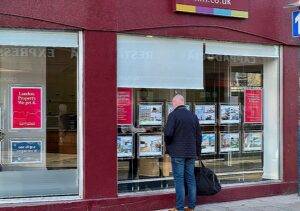
High interest rates are continuing to hit demand in the property market as potential buyers pull back from purchases because of increased mortgage costs.
The number of mortgage approvals fell last month to a five-month low of 49,400, below City expectations and down from 54,600 in June, according to figures from the Bank of England.
Housing affordability has been squeezed by real wages stagnating over the past 18 months and property prices remaining very high.
The Bank’s efforts to tame inflation with 14 successive rate rises has added to would-be homebuyers’ woes, with the base rate now at 5.25 per cent, up from 0.1 per cent in December 2021, sending mortgage rates up sharply.
Effective interest rates on new home loans rose to 4.66 per cent in July from 1.58 per cent in December 2021, the Bank’s monthly money and credit survey showed.
Moneyfacts’ data showed mortgage rates had hit a 15-year high of 6.7 per cent, indicating that the effects of the central bank’s rate rises were still to feed through fully.
The economy is showing signs of slowing under the pressure of tighter finance conditions. Purchasing managers’ indices last week showed that the private sector was operating at its weakest level in 31 months, caused by the powerful services sector contracting for only the second time over the same period.
Recession risks had emerged again owing to “the drag from higher interest rates . . . starting [to] weigh more heavily on activity”, Ashley Webb, of Capital Economics, the consultancy, said.
Latest figures from the Office for National Statistics show unemployment rose to 4.2 per cent in the three months to June, above forecasts from the City and the Bank. Britain’s housing market is responsive to the strength of the nation’s labour force, meaning that further rises in unemployment could accelerate the fall in property prices.
Zoopla, the property search site, said sales could slow this year to their lowest level since 2012. According to Nationwide, the building society and a leading mortgage lender, property prices have fallen by 3.8 per cent over the past year, the steepest decline since 2009. It releases its latest market snapshot on Friday, with prices expected to have fallen by 3.9 per cent over the year to August.
Business Briefing Morning and midday updates on financial and economic news from our award-winning business team. Sign up with one click
Analysts said the pace of property price falls was set to accelerate because a wave of homeowners would be rolling on to new mortgages with steeper rates as the year progressed.
Thomas Pugh, an economist at RSM UK, said: “Admittedly, interest rates on new mortgages have now stabilised, but they remain at the highest level since the [2007-08] financial crisis. We still expect a peak-to-trough fall in house prices of about 10 per cent.”
Martin Beck, chief economic adviser to the EY Item Club, the forecasting body, said: “The fact that market interest rates have started to retreat following signs that the economy is weakening should take some of the pressure off weak mortgage demand. But while swap rates are lower than their early July peaks, they are still well above the levels seen in early summer.”
Credit card spending has been broadly stable over the past few months, increasing by £600 million in July despite the effective interest rate on cards hitting a record high of nearly 21 per cent. Households added an extra £400 million to their savings accounts in July, a step down from the £3.8 billion increase in June.
A measure of how much money can circulate around the economy, known as “M4 money”, stagnated last month for the first time in more than a decade, sparking warnings from monetarist economists that the country was on course for a recession. Monetarists argue that the Bank has delivered enough damage to the economy via rate increases and should take its foot off the brake.
Read more:
Higher interest rates push down UK mortgage approval rates as buyers delay moves






